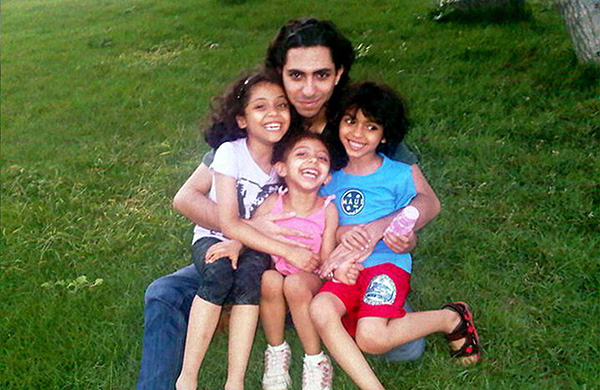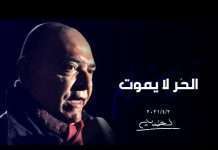Raif Badawi and Saudi “Justice”
Denis MacEoin/Gatestone Institute
June 8, 2015
http://www.gatestoneinstitute.org/5916/raif-badawi-saudi-justice
“My commitment is… to reject any oppression in the name of religion… a goal that we will reach in a peaceful and law-abiding way.” — Raif Badawi.
In another example of Saudi “justice,” Badawi’s lawyer, Walid Abu’l-Khayr, was jailed. He was sentenced to 15 years in jail, to be followed by a 15-year travel ban.
What is happening to Badawi is a perfect reminder to anyone who claims to be “offended” by “Islamophobia” why it might exist, who is to blame for it, and that it is precisely behavior such as this that justifies it.
You may have seen the face of Raif Badawi, a young Saudi man, or a short article about him, or impressive efforts by The Independent, to bring attention to the cruel punishments inflicted on him by a series of deeply illiberal Saudi courts: 1000 lashes — “very harshly,” the flogging order read — to be administered 50 at time for 20 weeks, or five months.
Raif Badawi is a 31-year old author, blogger and social activist, who gently tried to introduce just the smallest traces of enlightened thinking to the government and the religious elite of Saudi Arabia from his home in Jeddah.
He did this mainly through a website and public forum entitled, “Free Saudi Liberals.” An example of what he is now to be flogged to death for goes: “My commitment is… to reject any repression in the name of religion… a goal that we will reach in a peaceful and law-abiding way.”
It is for unspeakable thoughts such as this that the Saudi authorities have come down on him with such cruelty as to make themselves look globally like a pack group of insatiable, perverted, sadistic, sexual deviants.
Badawi’s life is in serious danger. He was detained briefly in 2008, on a charge of apostasy — a crime that carries the death sentence in the Saudi kingdom. In the following year, his bank accounts were frozen and he was banned from travelling outside the country.
He was arrested again on June 17, 2012, in Jeddah, after organizing a conference to mark a “day of liberalism.” The conference, which was to have taken place in Jeddah on May 7, was banned by the authorities. Several months later, on December 17, 2012, he first appeared before a General Court in Jeddah. This was not a court in the Western sense of the word, with jury selection, evidence, discovery, and so on. The vast majority of courts in Saudi Arabia are Shari’a courts, operating according to the rules of Islamic law and presided over by state-appointed clerics (‘ulama). On this occasion, the charges against Badawi were outside the norms of international law: “setting up a website that undermines general security,” “ridiculing Islamic religious figures,” and “going beyond the realm of obedience.” Some days later, the court decided to proceed with the charge of apostasy. More months passed, and on July 13, 2013 it was reported that Badawi had been sentenced to seven years’ imprisonment and 600 lashes for violating Islamic values and propagating liberal thought. His website was shut down.
But the Saudi judges were not done with him yet. On December 26, 2013 a judge recommended that he be brought before a higher court on the apostasy charge, then on May 7, 2014 his sentence was increased, now totaling 1000 lashes followed by ten years in prison and a large fine of around $260,000.
To make matters worse, in another example of Saudi “justice,” Badawi’s lawyer, Walid Abu’l-Khayr (Waleed Abulkhair), was jailed.
Abu’l-Khayr, from a prominent family of religious judges and clerics, had been listed in Forbes magazine as one of the top 100 Arab writers on Twitter. His wife, Samar, is Raif Badawi’s sister. Abu’l-Khayr had set up an organization named “Monitor of Human Rights in Saudi Arabia.” He was sentenced to 15 years in jail, to be followed by a 15-year travel ban.
On January 9, 2015, Raif Badawi received the first of his planned twenty flogging sessions: 50 lashes each time, to be delivered after Friday noon prayers outside Jeddah’s al-Jafali Mosque, across the road from the Ministry of Foreign Affairs. Badly hurt — he is a diabetic and physically frail — he faced almost certain death long before his punishment could be brought to an end. Doctors advised delay, and for many weeks, he was not subjected to further floggings.
In the meantime, an international campaign for his release started in earnest. Newspapers, magazines, radio and television stations across the West featured his story prominently. Everyone agreed that the prescribed punishments were cruel, inhuman, and degrading, and that the floggings amounted to torture, illegal under international law.
Criticism of Saudi inhumanity went to very high levels in Europe and North America. The U.S. State Department issued a strong statement on the affair. The National Assembly of Quebec passed a unanimous motion in condemnation. Britain’s Prince Charles, long familiar with the Saudi kingdom, raised the issue with the new King Salman. On March 3, 2015, sixty-seven members of the U.S. Congress sent a bipartisan letter to King Salman, calling for the release of all prisoners of conscience, including Badawi and Abu’l-Khayr.
The Swedish government, in protest at the conviction, went so far as to cancel an arms deal with Saudi Arabia. Seldom have the Saudis come under such a volume of international criticism as they have done over this one affair. A discreet retreat and the freeing of Badawi and Abu’l-Khayr might have paid off well for a country with a new monarch, facing terrorism on all sides, and negotiating help in its counter-terrorism efforts even from Israel.
But to renewed outrage around the world, it was reported on June 7 that the Saudi Supreme Court — originally thought to herald reform in the judicial system — has confirmed Badawi’s sentence finally in all respects. The only possible reprieve now would be a royal pardon. The judgement is, in effect, a slow, bloodthirsty, agonizing, death sentence handed to a man whose only concern was to speak gently but honestly in a country so backward that it prefers the outrages and injustices of seventh-century Arabia to anything, such as mercy, in the twenty-first century — the technology of which the Saudis are all too happy to avail themselves.
The Saudis cannot have it both ways. On one level, they are only too happy to join the modern world, building skyscrapers, funding universities, training scientists, and benefiting from the many luxuries and conveniences the Western world offers them. On another level, they reject everything that makes the West strong — freedom of conscience, thought and speech, an equal role for women in society, tolerance of other religions and philosophies, and the acceptance of either international law or the most elemental human rights.
Tomorrow, governments and rights organizations, along with ordinary citizens, will meet to plan their response to this abuse of decency.
If Raif Badawi is flogged again, and if he should die, his wife be widowed and his children orphaned, and the reputation of Saudi Arabia, already mired in the mud, will sink to a point beyond which it may never regain the trust or support of anyone. There is already unrest in the kingdom. The Saudi kingdom and its extremist cult of Wahhabism, its clerical elite, and its pompous princes know that they face attack from the Islamic State, and from Iran in Yemen and across the Gulf. Young Saudis, bribed and brainwashed though so many are, are not fools.
The Saudi Supreme Court’s judgement is worse than burying one’s head in the sands of the Empty Quarter [al-rub’ al khali], a large, almost uncrossable desert in Saudi Arabia. It is an admission of a complete inability to change, even while the world around it is shifting out of control.
What is happening to Badawi is also a perfect reminder to anyone who claims to be “offended” by “Islamophobia,” why it might exist, who is to blame for it, and that it is precisely behavior such as this that justifies it.
Everyone who thinks and feels will continue to work and pray for Raif Badawi’s release and his return to his wife and children at their home in Canada, where they obtained political asylum in 2013.
Denis MacEoin is a Distinguished Senior Fellow at the Gatestone Institute and a former lecturer in Arabic and Islamic Studies.
Saudi Supreme Court Upholds Jail, Lashes for Blogger
Naharnet/07.06.15
Saudi Arabia’s supreme court has upheld a sentence of 10 years in jail and 1,000 lashes against blogger Raif Badawi on charges of insulting Islam, his wife said on Sunday. The judgment came despite worldwide outrage over his case and criticism from the United Nations, United States, the European Union, Canada and others. “This is a final decision that is irrevocable,” Ensaf Haidar told AFP in a telephone interview from Canada. “This decision has shocked me.”
Badawi received the first 50 of the 1,000 lashes he was sentenced to outside a mosque in the Red Sea city of Jeddah on January 9. Subsequent rounds of punishment were postponed on medical grounds. Amnesty International slammed the “abhorrent” decision to uphold a “cruel and unjust sentence,” describing it as a “dark day for freedom of expression.”
“Blogging is not a crime and Raif Badawi is being punished merely for daring to exercise his right to freedom of expression,” said Philip Luther, Amnesty’s Middle East and North Africa director. Badawi’s wife expressed fear that the implementation of the flogging sentence “might resume next week.” “I was optimistic that the advent of (the Muslim fasting month of) Ramadan and the arrival of a new king would bring a pardon for the prisoners of conscience, including my husband,” she said.
Badawi co-founded the Saudi Liberal Network Internet discussion group. He was arrested in June 2012 under cyber-crime provisions, and a judge ordered the website shut after it criticized Saudi Arabia’s notorious religious police. The co-founder of the online venue, Suad al-Shammari, was released from jail in February. But Badawi’s lawyer, Walid Abulkhair, who is also a rights activist, remain behind bars. Badawi and Abulkhair have been nominated for this year’s Nobel Peace Prize by Norwegian member of parliament Karin Andersen.
His supporters have launched a campaign on Twitter using the hashtag #backlash that has gathered momentum, and posted pictures of people with lashes drawn on their backs with red lipstick. Saudi Arabia in early March dismissed criticism of its flogging of Badawi and “strongly denounced the media campaign around the case.” In his first letter from prison published by the German weekly Der Spiegel in March, Badawi wrote how he “miraculously survived 50 lashes.”
Badawi, 31, recalled that he was “surrounded by a cheering crowd who cried incessantly ‘Allahu Akbar’ (God is greatest)” during the whipping.
“All this cruel suffering happened to me because I expressed my opinion,” Badawi wrote. Badawi’s wife and their three children have received asylum in Quebec, in Canada. Quebec’s Immigration Minister Kathleen Weil said in March that her government would “continue its defense of Mr. Badawi,” saying this was a “clear case of human rights violation.”Saudi Arabia’s ambassador to Canada, Naif Bin Bandir al-Sudairy, complained officially.
المحكمة السعودية العليا تؤيد السجن والجلد بحق المدون رائف بدوي (زوجته)
نهارنت/07 حزيران/15/أيدت المحكمة السعودية العليا حكم السجن عشر سنوات والجلد الف مرة للمدون رائف بدوي المسجون بتهمة “الاساءة للاسلام”، بحسب ما اعلنت زوجته الاحد لوكالة فرانس برس. وقالت انصاف حيدر عبر الهاتف من كندا “لقد اكدت المحكمة العليا الحكم بالسجن عشر سنوات اضافة الى عشر سنوات اضافية من منع السفر والجلد الف جلدة بحق رائف”. واضافت حيدر “للاسف صدمني هذا القرار، خصوصا اننا كنا متفائلين انه مع اقتراب رمضان وفي ظل حكم الملك الجديد (سلمان)، وكنا نتأمل ان يتم العفو عن سجناء الرأي وبينهم زوجي”.وتعيش حيدر في كندا. والاحد، انتقدت منظمة العفو الدولية قرار المحكمة السعودية العليا، وقال فيليب لوثر مدير فرع المنظمة في الشرق الاوسط وشمال افريقيا “من المشين ابقاء هذا الحكم الوحشي والظالم”. واعتبر انه برفضها العودة عن هذا الحكم فان السلطات السعودية “اظهرت ازدراء بالعدالة وبالاف الاصوات التي طالبت بالافراج الفوري وغير المشروط (عن بدوي) في مختلف انحاء العالم”. واعتقل بدوي (31 عاما) في 17 حزيران 2012 وحكم عليه في ايار 2014 بالسجن عشر سنوات وغرامة مليون ريال (267 الف دولار) والف جلدة موزعة على 20 اسبوعا. ونفذ الحكم باول خمسين جلدة امام مسجد الجفالي في جدة في التاسع من كانون الثاني. ولم يتم تنفيذ اي عمليات جلد منذ الجولة الاولى. واثارت هذه القضية استياء في العالم ووصفت الامم المتحدة الحكم بانه “وحشي وغير انساني”. وبدوي مؤسس “الشبكة الليبرالية السعودية الحرة” مع الناشطة سعاد الشمري، وحائز جائزة جمعية “مراسلون بلا حدود” للعام 2014 عن حرية التعبير. وقد اغلقت السلطات الموقع.
مصدر/وكالة الصحافة الفرنسية

















